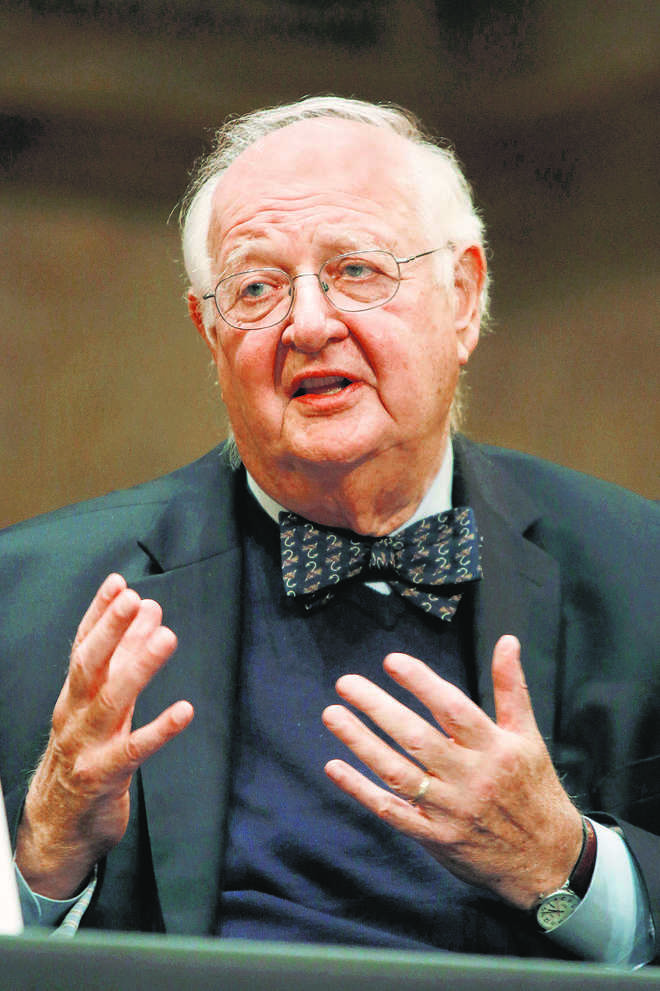
Angus Deaton, Nobel Prize laureate
Janak Raj Gupta
The recipient of this year's Nobel Prize in economics, Professor Angus Deaton has written much about poverty and inequality, and “the threat that extreme inequality poses to democracy’. Luckily, India was the testing laboratory for him to prove his ideas on various social issues such as poverty, nutrition, health and education. Deaton conducted some of his research in the tribal areas of Rajasthan, one of the BIMARU states. His widely held belief that the measurement of poverty should be through consumption rather than income needs to be given due consideration. In fact, the measurement of poverty in India was first pioneered by V.M. Dandekar and Nilkanth Rath in the 1970s, taking per capita minimum calories' requirement as the base. It was later on that the policy makers shifted to income in order to define poverty due to administrative convenience.
It is true that Deaton is highly appreciative of India's success in building a better life for many. As he says, “Some of them now have consumption patterns that look like those of the Americans or Western Europeans, and not a few have become fabulously rich”. But he is sceptical about the statistical data policy makers often use.
Recently, there has been growing concern in the world about the probable inter-relationship between inequality and poverty. The world over a new thinking that is developing is on the lines that growth automatically does not benefit the poor. The trickle-down theory of growth does not work. Deaton has also highlighted that when conditions are conducive for widening inequality, removal of poverty would not be sustainable. After receiving the Nobel Prize, Deaton, in one of his interactions with the Press, remarked that the rich should help to pull up others. Poor people should also see the new opportunities and understand that, with education, their sons and daughters can also prosper. But if those who have escaped poverty block those who are still imprisoned by it, the situation would be terrible.” Decent education, available and effective healthcare, and functional sanitation are goods that benefit everyone. The new middle class should be more than happy to pay the taxes that help others share their good fortune. Deaton often quotes Adam Smith, “Every tax to the person who pays it, is a badge, not of slavery, but of liberty.” Thus, there is growing evidence suggesting that there is no contradiction between pro-equity and pro-poor growth model.
Earlier too, the World Economic Forum, (WEF), in its report released in September 2015, had observed that there is accumulation of evidence that reducing inequality can actually strengthen economic growth. In the same vein, recent research by the IMF has also suggested that the income distribution itself matters for growth. “If the income-share of the top 20 per cent (the rich) increases, then GDP growth actually declines, suggesting that the benefits do not trickle down. In contrast, an increase in the income-share of the bottom 20 per cent (the poor) is associated with higher GDP growth. The poor and the middle class matter the most for growth.”
However, one is disillusioned to find the policy shifts of the new government, which has been dubbed as “pro-corporate” or “pro-capitalists”. According to the “World Wealth Report 2015,” India is home to the largest population of millionaires and this number has grown from 1.56 lakh in 2013 to 1.98 lakh in 2014. A quantum jump of 27 per cent in a single year is the largest gain in the world. However, in the current fiscal budget (2015-16), the government abolished the wealth tax. Corporation tax on profits too has been proposed to be cut to 25 per cent, from the existing 30 per cent. Social sector spending for the poor, comprising education, health, social security, food security, drinking water, Scheduled Caste /Tribes, etc, was slashed. Agriculture too, which has been identified as the main driving force to reduce distributional inequalities, was left out. Even Maneka Gandhi, the Union Minister for Women and Child Development, publicly criticised the government policies for huge budget cuts which has made it difficult to implement plans to fight against child malnutrition.
The Noble Laureate has also lamented the disproportionate expenditure by the poor on private healthcare as health facilities in the public sector are not commensurate.
The fact remains that in case of fiscal transfers from the rich to the poor, much needs to be done. The age-old thinking that more money in the hands of the rich would promote savings and investment, and thereby income and employment, stands rejected. In case of a low-tax regime, the rich with a higher propensity to save are doubly benefitted. They not only evade or avoid taxes by investing in tax-saving instruments but also benefit by getting a positive rate of return on their savings. Therefore, the rate of interest on tax-saving instruments needs to be cut. Even the expansionary monetary policy announced recently will further widen inequalities as it is expected not only to raise the income of the corporate sector but will also lower the income of the fixed-income groups. Since there are no organised labour unions, even new entrants will have to suffer at the hands of neo-capitalists.
The redistributive role of fiscal policy must be reasserted. Greater reliance on wealth and property taxes, more progressive income taxation, removing opportunities for tax avoidance/ evasion, and better targeting of social benefits need to be reinforced. There is no inherent trade-off in economic policy-making between the promotion of social inclusion and that of economic growth. It is possible to be pro-equity and pro-growth at the same time.
The writer, a former Professor, is UGC Emeritus Fellow, Department of Economics, Punjabi University, Patiala



























